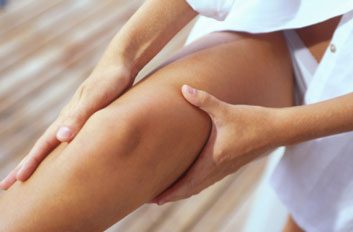
Exfoliate for softer skin
• Give your skin a milk bath. The lactic acid in milk exfoliates dead skin cells and may also increase skin’s ability to hold in moisture. Soak a washcloth in cold milk. Lay the cloth on any area of skin that is particularly dry or irritated. Leave the cloth there for five minutes, and when you rinse off the milk, do it gently, so some of the lactic acid stays on your skin.
• To soften rough patches of skin, fill your tub with warm water and add two cups of Epsom salt, then climb in and soak for a few minutes. While your skin is still wet, you can also rub handfuls of Epsom salt on the rough areas to exfoliate the skin. You’ll be amazed at just how good your skin feels when you get out. If you have some, you can also add a few strips of dried seaweed to your bath to boost the softening effect.
• Apply aloe vera gel to help your dry skin heal more quickly. It contains acids that eat away dead skin cells. To obtain the gel, cut off a leaf at the base and split it open with a knife. Scrape out the gel with a spoon.
• Use moisturizer that contains alpha-hydroxy acids. These remove loose, flaky skin cells, leaving the skin softer. Lotions that contain urea have a similar effect.

Add more moisture
• Pit an avocado, puree the pulp, and pat it on your face as a moisturizing mask. The oil acts as an emollient. It also contains beneficial vitamin E.
• Turn to any of these inexpensive products to trap in skin’s own moisture: lanolin (obtained from wool), petroleum jelly, mineral oil, peanut oil or even vegetable shortening (such as Crisco). Just use them sparingly to avoid feeling greasy.
• For seriously chapped hands, try a product called Bag Balm, used by farmers to soften the udders of cows.

Switch soaps
• If you use a deodorant soap, stop. These soaps dry the skin, and they contain perfumes, which are irritants.
• Use a superfatted soap like Dove, Oil of Olay or Neutrogena. These have extra oil or fat added late in the soap-making process. They leave a beneficial oil film on the skin.
• Try gentle cleaners like Cetaphil and Alpha-Keri. The milder soaps in general have a pH (a measure of acidity) which is closer to that of your skin. They remove dirt without stripping away too much natural oil.
• Liquid soaps also tend to be gentler on your skin. Put a squirt bottle next to your sink for washing your hands.

Shower sparingly
• Never stay in the bath or shower for more than 15 minutes. When you take long soaks, you’re washing away your skin’s protective oils. And use lukewarm water, not hot. Hot water tends to strip the oil from your skin.
• During winter months, when your skin is extra dry, just bathe two or three times a week. On the “days off,” you can get by with sponge-bathing sweaty areas.
• Take a bath or shower in the evening, so your skin can replace protective oils overnight while you’re sleeping.

Humidify your home
• In the winter, make sure the humidity in your house is between 30 and 40 percent. If your house has forced-air heating or steam radiators, the actual humidity may be far less-often, as little as 10 percent. But a plug-in humidity gauge at a home-supply or hardware store to keep tabs on the humidity. When it gets below 30 percent, turn on a humidifier.
• In summer, turn on the air conditioner only when you absolutely need it. It dehumidifies the air as well as chilling it.
• If you have a fireplace or wood-burning stove, use it sparingly. The heat that’s generated from these sources is extremely drying.

Stay hydrated
• Be sure to drink at least eight 250 mL glasses of water each day. Herbal teas and juices also count, but not caffeinated beverages like black tea, coffee and sodas containing caffeine, or any drinks that include alcohol. All of those have a diuretic effect, which means you’ll lose body fluids because you’ll have to urinate more frequently.
• At least twice a week, eat some oily, cold-water fish like herring or salmon. These are rich in omega-3 fatty acids, which help keep your skin-cell membranes healthy. Other good sources of these fatty acids are walnuts, avocados and flaxseed oil. Mix up to two tablespoons of flaxseed oil each day into your salad dressing or your morning oatmeal. (If you add it to hot cereal, do so only after the cereal is cooked. Flaxseed oil breaks down into less-useful compounds if you cook with it.)

Get your fill of vitamins and minerals
• Certain vitamins and minerals help support healthy skin. Every day, take 100 mg of a B-complex vitamin supplement containing thiamin, riboflavin and pantothenic acid; 15 mg of beta-carotene in divided doses, with meals; and 15 mg of zinc.
• Look for products that offer an array of skin-enhancing nutrients in one pill. Look for a pill formula containing vitamin A, vitamin C, vitamin E, riboflavin, vitamin B6, folate, zinc, selenium and other minerals.
Related:
• 5 foods to eat for healthy, glowing skin
• 5 reasons your skin is dry
• How exfoliation helps your skin
